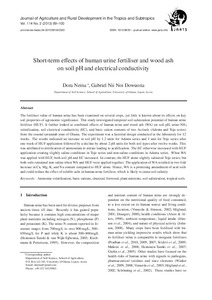Aufsatz

Short-term effects of human urine fertiliser and wood ash on soil pH and electrical conductivity
Zusammenfassung
The fertiliser value of human urine has been examined on several crops, yet little is known about its effects on key soil properties of agronomic significance. This study investigated temporal soil salinization potential of human urine fertiliser (HUF). It further looked at combined effects of human urine and wood ash (WA) on soil pH, urine-NH_3 volatilisation, soil electrical conductivity (EC), and basic cation contents of two Acrisols (Adenta and Toje series) from the coastal savannah zone of Ghana. The experiment was a factorial design conducted in the laboratory for 12 weeks. The results indicated an increase in soil pH by 1.2 units for Adenta series and 1 unit for Toje series after one week of HUF application followed by a decline by about 2 pH units for both soil types after twelve weeks. This was attributed to nitrification of ammonium to nitrate leading to acidification. The EC otherwise increased with HUF application creating slightly saline conditions in Toje series and non-saline conditions in Adenta series. When WA was applied with HUF, both soil pH and EC increased. In contrast, the HUF alone slightly salinized Toje series, but both soils remained non-saline whenWA and HUF were applied together. The application ofWA resulted in two-fold increase in Ca, Mg, K, and Na content compared to HUF alone. Hence, WA is a promising amendment of acid soils and could reduce the effect of soluble salts in human urine fertilizer, which is likely to cause soil salinity.
Zitierform
In: Journal of Agriculture and Rural Development in the Tropics and Subtropics. Kassel : Kassel University Press. - Vol. 114, No. 2 (2013), S. 89-100Sammlung(en)
Vol 114, No 2 (2013) (Journal of Agriculture and Rural Development in the Tropics and Subtropics (JARTS))Zitieren
@article{urn:nbn:de:hebis:34-2013081343323,
author={Neina, Dora and Dowuona, Gabriel Nii Noi},
title={Short-term effects of human urine fertiliser and wood ash on soil pH and electrical conductivity},
year={2013}
}
0500 Oax 0501 Text $btxt$2rdacontent 0502 Computermedien $bc$2rdacarrier 1100 2013$n2013 1500 1/eng 2050 ##0##urn:nbn:de:hebis:34-2013081343323 3000 Neina, Dora 3010 Dowuona, Gabriel Nii Noi 4000 Short-term effects of human urine fertiliser and wood ash on soil pH and electrical conductivity / Neina, Dora 4030 4060 Online-Ressource 4085 ##0##=u http://nbn-resolving.de/urn:nbn:de:hebis:34-2013081343323=x R 4204 \$dAufsatz 4170 7136 ##0##urn:nbn:de:hebis:34-2013081343323
<resource xsi:schemaLocation="http://datacite.org/schema/kernel-2.2 http://schema.datacite.org/meta/kernel-2.2/metadata.xsd"> 2014-02-03T12:09:47Z 2014-02-03T12:09:47Z 2013 1612-9830 urn:nbn:de:hebis:34-2013081343323 http://hdl.handle.net/123456789/2013081343323 eng Kassel University Press Urheberrechtlich geschützt https://rightsstatements.org/page/InC/1.0/ ammonia volatilisation basic cations charcoal firewood plant nutrients soil salinization tropical soils 630 Short-term effects of human urine fertiliser and wood ash on soil pH and electrical conductivity Aufsatz The fertiliser value of human urine has been examined on several crops, yet little is known about its effects on key soil properties of agronomic significance. This study investigated temporal soil salinization potential of human urine fertiliser (HUF). It further looked at combined effects of human urine and wood ash (WA) on soil pH, urine-NH_3 volatilisation, soil electrical conductivity (EC), and basic cation contents of two Acrisols (Adenta and Toje series) from the coastal savannah zone of Ghana. The experiment was a factorial design conducted in the laboratory for 12 weeks. The results indicated an increase in soil pH by 1.2 units for Adenta series and 1 unit for Toje series after one week of HUF application followed by a decline by about 2 pH units for both soil types after twelve weeks. This was attributed to nitrification of ammonium to nitrate leading to acidification. The EC otherwise increased with HUF application creating slightly saline conditions in Toje series and non-saline conditions in Adenta series. When WA was applied with HUF, both soil pH and EC increased. In contrast, the HUF alone slightly salinized Toje series, but both soils remained non-saline whenWA and HUF were applied together. The application ofWA resulted in two-fold increase in Ca, Mg, K, and Na content compared to HUF alone. Hence, WA is a promising amendment of acid soils and could reduce the effect of soluble salts in human urine fertilizer, which is likely to cause soil salinity. open access In: Journal of Agriculture and Rural Development in the Tropics and Subtropics. Kassel : Kassel University Press. - Vol. 114, No. 2 (2013), S. 89-100 Neina, Dora Dowuona, Gabriel Nii Noi Gedruckte Ausg. im Verlag Kassel Univ. Press (www.upress.uni-kassel.de) erschienen. </resource>
Die folgenden Lizenzbestimmungen sind mit dieser Ressource verbunden:
Urheberrechtlich geschützt

